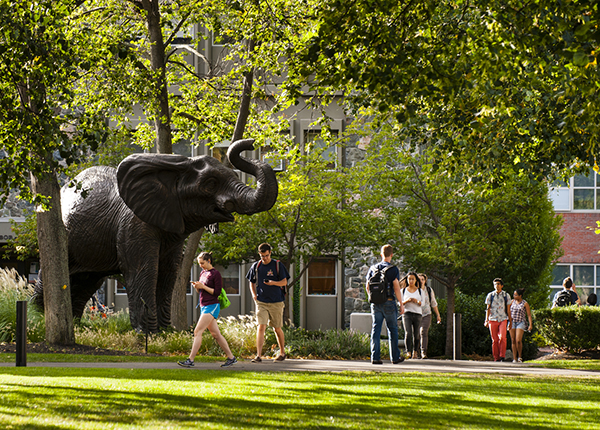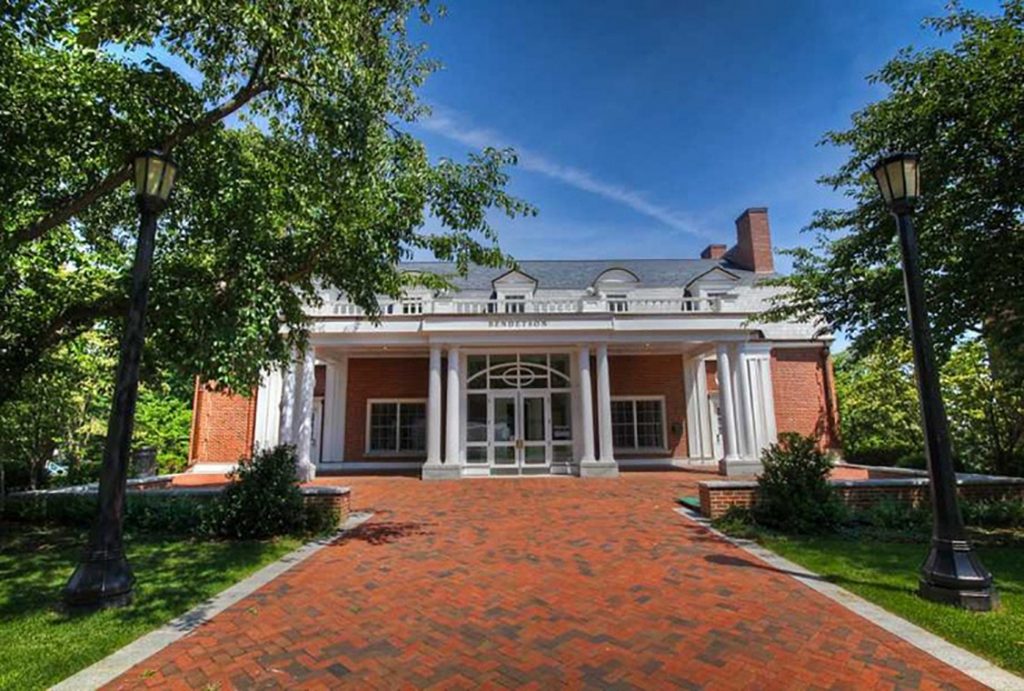By TJ Pinto, OTD ’24

Prior to coming to Tufts, I was so curious to learn what life as a graduate student was like. For me personally, graduate school at Tufts is quite a bit different from my experience at my undergraduate institution. For starters, my undergraduate institution was larger than Tufts, with many of my lectures having anywhere from 100-300 students in it. At Tufts, my cohort consists of only 32 people, and this group is sometimes split into even smaller groups for certain courses. The purpose of the first year of the Entry-Level Occupational Therapy Doctoral program is to create a solid foundation, making very unfamiliar concepts feel like second nature by the end of the first year. This allows us to enter our practice classes with an understanding of a lot of the basics of the profession, like how to write SOAP notes, common health conditions we’ll see in practice, and general developmental themes and theoretical models throughout the lifespan for children, adolescents, and adults. While my overall schedule may change a bit each week, this is what a week in my life is like as a first-year OTD student at Tufts.

Monday
On Monday mornings, I make my way up to the library for my Topics in Emerging Practice Areas class. As someone who has always been very focused on the idea of working in a more medical setting, like a hospital or an outpatient clinic, this class has opened my mind up to numerous practice areas that I did not know were possible for OTs to work in. Many weeks, we have speakers come in to share about the emerging practice area that they work in, such as working in homeless shelters, refugee health, transgender health, and more. Throughout the semester, we are also working in groups to come up with ideas for our own emerging practice areas, practicing how to create an effective elevator pitch for our practice area, how to present to stakeholders, and of course, considering how OT would be crucial to this emerging practice area. My group’s project is focused on the idea of a canine training program for adolescents in the inpatient mental health setting, working on various occupations, such as education, vocation, Instrumental Activities of Daily Living (IADLs), and social participation.
In the afternoon, I have my Occupation & Adaptation (O&A) class. Last semester we had an O&A class focused on children and adolescents while this semester is specifically focused on adults. Through this class, we are learning about the developmental themes and theoretical models of the adult life cycle, ranging from early to late adulthood while considering physical, psychological, and social changes and the influences of numerous factors on one’s life experience. This class has a service learning component in which we volunteer with an organization in the community with the adult population. This class also has a lab component, allowing us to take the lecture material from earlier in the class and to apply our knowledge in a more hands-on way, which I have found to be useful in really drilling concepts down in my head.
Following O&A, the last thing that I have in the day is meeting with my Project Connect group. Earlier in the semester, a professor reached out to me and some classmates about being facilitators for Project Connect, an initiative through Tufts Counseling & Mental Health Services that allows graduate and undergraduate students to form meaningful connections with other students on campus. Each week, my classmate and I meet with a small group of graduate students to have guided conversations about our lives and experiences, working towards forming connections with one another. It has been a fun and enjoyable opportunity for me to interact with students from other programs that I normally may not have had the opportunity to meet.
Tuesday
Tuesdays begin with my service learning placement for my O&A class at an adult day habilitation program for adults with developmental disabilities. My co-leader happens to be the same person I facilitate Project Connect with, my classmate and friend, Chloe. We actually ran groups at our current site last semester too, though, at the time, it was for our Group Theory class, where we were learning how to run effective groups as future OTs. Last semester, Chloe and I focused our groups on mindfulness and arts and crafts. Moving into this semester, we wanted to change our focus to Instrumental Activities of Daily Living (IADLs), creating weekly cooking groups. Fortunately, our service learning site has an accessible kitchen, allowing us to run these groups with a number of participants. We’ve made everything from pasta to cookies to quesadillas. With each group, we must use our OT-lens to adapt the group so that each person is able to participate. These groups are a fun challenge for me and Chloe while also being very enjoyable for our fantastic group members, who always seem to enjoy the process from start to end–– though of course, eating is by far the best part.
Following our service learning placement, Chloe and I will head back to campus for our Clinical Research class. To be completely transparent, this course was one that I was pretty intimidated by as someone who has been awful at math since the first grade and is easily intimidated by statistics. Fortunately, this course is not just a lecture-heavy statistics refresher. We also have the opportunity to work on a group research project throughout the entire semester, using this to implement lecture material in a way that is more enjoyable. For example, at the beginning of the semester, we all stated our preferences for our research project prior to being grouped together, with the topics including perfectionism, sleep, mindfulness, and positive emotions. After being placed in the positive emotions group and taking a pre-test, my group and I found an evidence-based treatment intervention for increasing positive emotions in one’s life. We then implemented this intervention in our lives for one month, then we took a post-test to inform our research paper. Eventually, we will present our findings at the end of the semester.
Wednesday
I only have one class on Wednesdays, my Health Conditions II class. This is the second of three required Health Conditions courses, which are courses that focus on different conditions each week that we will see as clinicians. We focus on the incidence and prevalence, etiology, occupational consequences, short and long-term impacts, and OT interventions associated with each condition. One really great aspect of this course is that we commonly will have speakers come in from the community to speak about different conditions or practice areas related to certain conditions. For example, we have had OTs come in to speak about working with individuals with spinal cord injuries/disorders and low vision, as well as professionals from other fields, like a certified prosthetist to teach us about limb deficiencies, amputations, and prosthetics. We have also had certain lectures in which we learn about a specific condition, like stroke or Parkinson’s Disease, then have a community member living with this condition speak about their experience and how OT could help.
Following Health Conditions II, I have a mandatory open block set from 12-1:20pm, which is a time that is set aside each week for the department (including students) to hold meetings, speakers, events, and more. Students in the OT program are automatically considered to be members of the Student Occupational Therapy Association (SOTA), which is an organization that will often bring in guest speakers for these open blocks and will hold social events.
After the open block, I walk back up to Bendetson Hall, as I am a student worker in the Office of Graduate Admissions. In this job, I do everything from administrative work, writing blogs, assisting with virtual open houses, and giving in-person or virtual tours to prospective and admitted graduate students. I loved my job working in undergraduate admissions as a campus tour guide at my undergraduate institution, so it has been great having the opportunity to continue this in graduate school.

Thursday
My Thursday mornings begin with Clinical Reasoning II, a foundational course that is focused on the evaluation process, interviewing skills, documentation, and more. Prior to taking Clinical Reasoning I last semester, the idea of sitting in a course like this sounded like it would be so dry. However, these courses have turned out to be a favorite of mine. Throughout the semester, I can genuinely see the improvement that is being made. I feel more and more like an OT each week. Lately, we have been focusing a lot on documentation, which is a really important subject area, as documentation is necessary for insurance coverage, justification of treatments, and more. My class has been practicing documentation skills through simulation cases this semester, whether it be through a real patient that we can access through an online video simulation library, or written cases. Each week we practice a new skill, whether it be goal writing, SOAP notes, or getting comfortable with using codes for evaluations and interventions in our notes. These are all skills we will very likely use on a daily and even hourly basis as future practitioners. I’m looking forward to seeing how I will continue to strengthen my clinical reasoning skills throughout this course and in future courses.
My second and final class of the day is my DEC Seminar I course. This course is the first of three courses that are aimed at preparing us for the Doctoral Experiential Component (DEC) portion of the curriculum. The DEC is a 14-week experience in our final year of the program where we’ll work on a specific DEC project. This semester, I am preparing materials that will be viewed when pairing me with my mentor for my future DEC project, such as an ePortfolio containing my resume, OT vision, clinical interests, and more. In this course, my class is often broken up into three smaller sections, allowing each student to receive feedback on ePortfolio materials and assignments in class from our professors and/or classmates, which is much less intimidating and doable with 8-12 people rather than the entire cohort. I have found this course to be very helpful for my professional development as a whole.
Friday
I actually do not have any classes on Fridays this semester! This means that I am able to work in the Office of Graduate Admissions in the morning, push myself to be productive and do some schoolwork in the afternoon, and then enjoy the evening however I see fit, whether that means I’m hanging out with friends or laying in bed watching Netflix to unwind after a long week.

Weekend
My weekends vary from week to week, though this semester, my friends and I have been making a more active effort to have fun on the weekends. We will often take the Red Line on the T (the main subway system for the Boston area) from Davis to places like Cambridge or Boston to get food, explore the area, and more. There’s also a new Green Line stop that is being constructed directly on campus, known as the Medford/Tufts stop, which will be another great way to get into the city. My current favorite place in Boston would probably be the North End, as I am a huge fan of Italian food and this area is amazing for this. There are also so many great coffee shops, parks, and places to hang out with friends as well. Of course, I’m still very new to the area, so I have a lot of exploring left to do.
As someone who spent the past ten years living in a rural town in Delaware, the change of pace has been incredible. I remember getting to campus last summer and sitting on top of the Tisch library as I talked to my friend from home on the phone, watching the sun as it set over the city and the Boston skyline began to light up beneath the night sky. I remember being so excited about the fun and spontaneous experiences that were to come, like the Red Sox vs. Yankees game my friends and I attended last minute for just $9 last summer. Being at Tufts has allowed me to broaden my horizons, learning from faculty with incredible connections and experiences in the field I am pursuing while being able to gain valuable hands-on experiences from the very start of my program, both in and out of the classroom. While my weekly schedule is jam-packed with classes, service learning placements, and numerous extracurriculars, I am truly so thankful to be here at Tufts.
